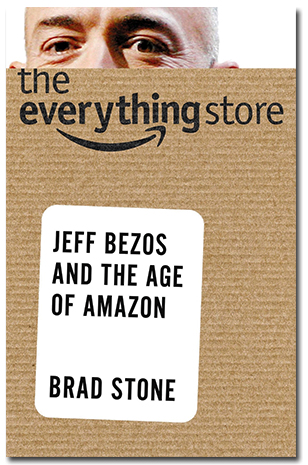The Everything Store, review: The rise and rise of Amazon's Jeff Bezos

Reading through The Everything Store: Jeff Bezos and the Age of Amazon by Brad Stone, we learn a lot about Jeff Bezos — where he came from, and what motivated him to become one of the world's leading entrepreneurs. The fact that he now runs one of the world's largest companies came about partly by accident, but mainly through the sheer, driving focus of this extraordinary man.

Brad Stone is a senior writer on Bloomberg Businessweek and has covered Amazon for several years. After interviewing Bezos for just one hour, he emerged with a reserved 'OK' for the book and an agreement not to interfere before publication.
After publication, however, came an interjection from an unexpected source: Bezos's wife, MacKenzie. And what does she have to say about the book? Her review gives it one star out of five (the minimum allowed on Amazon's site) on the basis that it contains "numerous factual errors" and is "full of techniques which stretch the boundaries of non-fiction". According to MacKenzie Bezos, Stone's book is "a lopsided and misleading portrait of the people and culture at Amazon".
If you're a publisher, you can't ask for better publicity than that: the wife of the biographer's subject trashes the book in a review written on the subject's website. Bear in mind, though, that a reviewer is ideally (a) knowledgeable (we can't fault you there MacKenzie) and (b) impartial (sorry MacKenzie, but we have to fail you on that one).
From books to everything
This is a very readable story of how Amazon grew from being a bookseller to becoming The Everything Store. And as with all really good stories, we learn things along the way. Some of these things are simple, like the vital importance of keeping the customer first.
Many retailers, and other companies, pay lip-service to the customer-first principle, but the ones that remain successful are those that live and breathe it. As Bezos puts it: "We are genuinely customer-centric, we are genuinely long-term oriented and we genuinely like to invent."
That is Bezos the pragmatic businessman. However, there is also another side to Bezos — a philosophical one. This is the Bezos who believes in 'the narrative fallacy' — something raised by Bezos during his first meeting with Stone: "How are you going to handle the narrative fallacy?"
The narrative fallacy is a theory first put proposed in 2007 by epistemologist Nassim Nicholas Taleb in his book The Black Swan. That was just six years ago, well after Amazon was founded, but the book is required reading for every new executive hire at the company and does go some way to explaining how Amazon has become the company it is today.
Amazon's culture of growth is unique, uniquely successful and, apparently, unstoppable. Bezos, it seems, will not rest until we all become Amazon customers.
The book looks at the extreme impact that certain kinds of rare and unpredictable events have on us, and the human tendency to find simplistic explanations for these events retrospectively. We feel more comfortable if we can see a rational explanation for something that appears inexplicable, rather than trying to accept that some things happen for an entirely random reason.
For Bezos, this is an explanation for how his company can grow and profit. The way forward, as he sees it, is for the company to keep looking for new ideas and new markets in a random way. While the rest of the world seeks comfort in familiarity and conformity, Bezos wants the opposite.
Bezos, Stone acknowledges, is building a company edifice unlike any other. Amazon's culture of growth is unique, uniquely successful and, apparently, unstoppable. Bezos, it seems, will not rest until we all become Amazon customers.
Is that an efficient way for the world to work? That remains to be seen, but after reading this book I can see how it could happen. It will be via Amazon's greatest creation, Amazon Web Services (AWS). I say 'greatest' because AWS combines the genius of Amazon's retail model with the power and accessibility of the web.
Brad Stone's account is a gripping story of spectacular growth and success, although there is a downside in that success is generally measured only in profit — not a notable feature of Amazon's business model to date. Bezos has no intention of turning his company into a profit engine just yet, but may well find himself forced to do so if his backers lose patience.
Last year I took the decision to spend more time at my local booksellers, only using Amazon for the odd professional purchase. After reading The Everything Store I see no reason to change that decision.